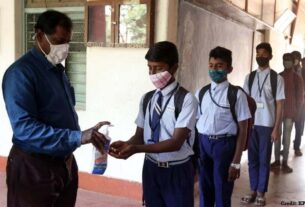Teachers face difficulty in correcting students’ behaviour during online classes.
As he got ready to attend his first online class of the day, Veer turned his camera on with a sparkle in his eyes hoping to see his friends. But what he saw next, came as a surprise to him as some of his classmates entered the meeting room with improper names and disturbed the class. The teacher removed them from the group but disappointment had already set in him. He is only a 2nd grade student studying in St. Thomas School, Ranchi.
As education moved online during the pandemic, teachers are neither able to detect unruly behaviour nor are they able to support a child by correcting their behaviour.
Atashi Sharma, a teacher for grades 1-5 explained the difficulty in handling students during online classes. She said, “Children used to turn their cameras off and make sounds to disturb the class. Some of them used to start screen sharing between the class or message. We could only ask students to keep their camera on at all times to be able to deal with the issue. Such issues do not come up during offline classes as students are aware of getting caught and punished”.
Shikha Suresh, a child psychologist said, “Online interfaces are new to children. Children understand that in physical classes the control is in the hands of the teacher but when it is online the child is aware that the control (mic, video) lies in their hands where it is difficult for the teacher to reach out to them.”
Conduct disorder is the inability to control oneself from breaking rules and is usually detected through close monitoring of school-going children below 15 years. According to a report, symptoms range from the urge to break rules to bullying, vandalism and irritability.
“A student’s behaviour is gauged on the basis of their performance and discipline, however online schooling takes away the ability to observe a student’s behaviour in person. It is not impossible to detect behavioural changes in students in the online mode. However, online counselling is less effective than offline as too many details are missed,” said Radhika K, ex-principal, Howard Public School, Hyderabad.
“When you are seeking counselling online, there is a lack of physical connection. A child’s attention span is very less making online counselling for an alteration in behaviour ineffective,” Suresh added.
According to research published in the Journal of Evolution of Medical and Dental Sciences, the prevalence of conduct disorder in school going children in rural areas in India was found to be 5.48 percent.
Srinivas T, a parent said, “Interaction is the only solution for online schooling, but this is an unrealistic expectation as one teacher cannot handle multiple students online. Behavioural aspects cannot be monitored online by teachers, only parents can do it. Parents should ensure this by checking upon their children from time to time during school hours”.
According to a report by the Centers for Disease Control and Prevention, conduct disorder is also termed as an externalising disorder as it involves showing aggressive behaviour towards other people and being unable to respect ones’ privacy and opinion.
“Social exposure is a vital part of a child’s development. Compared to pre-pandemic times, children did not have the opportunity of gaining exposure to the society. Also, in school, children are closer to friends and build healthier relationships which boost their self esteem,” added Atashi.
“Since kids are home most of the time and as we know that they cannot channelize their energy in a productive way, they turn to other things that might be harmful or destructive in ways. Most of the time, it is for fun. This is also one of the main reasons that also contribute to online bullying,” Suresh said.
Children usually learn through modelling, imitating adults and are very quick to grasp content they watch. These are some of the factors that contribute to conduct disorder.
Domestic Violence
“Domestic violence is one of the factors that contribute to the development of conduct disorders in children. Irrespective of how the environment was at home, when children went to school they could focus on their studies in a calm environment. However, with online classes the same cannot be achieved,” said Suresh.
“If the father is using curse words, the child tends to pick it up. Also when there is violence at home, children tend to take over the power role and as a result they take it down through violent behaviour on other kids”, she added.
Content Exposure
“It is important for parents to keep a track of what their children are watching as it has a direct impact on the overall behaviour of a child. I make sure that my children are not exposed to meaningless content but focus more on channels like Discovery or NatGeo”, said Srinivas. Content regulation is a vital key in grooming children, he added.
Counseling and parent involvement are the key methods to deal with behavioural issues in schools, Radhika said.
“Parents don’t spend enough time with their children. It is important to keep a track of a child’s actions and words, interests and friend circle. If this is done, then one can control what the child is exposed to. Children who don’t have control over themselves, tend to control other people,” she further added.



